All Hands on Deck
Oct 20, 2016
All Hands on Deck
A couple of years ago, when our youngest child was in kindergarten, I visited the classroom. It was chaos. Little people running around. Lots of noise. Even a little bit of stinkiness. It was more commotion than I was used to in a confined setting. The teacher did an amazing job of corralling the energetic kids and directing them towards productive activities. But she was not alone. She was often helped by Jim.
Initially, I thought Jim was a grandparent who helped out from time to time. Later, I thought he was a co-teacher given his great level of involvement. He focused on reading skills, including with our son, Andrew. Andrew benefited from the attention but he also liked Jim’s company. Andrew spoke fondly of how nice it was to have someone like ‘Papa’ or ‘Grandpop’ around even though his grandfathers lived across country.
Experience Corps
It turns out that Jim wasn’t related to any of the kids in the class. He was a volunteer as a part of Experience Corps, an organization that Marc Freedman of Encore.org helped launch and that is now part of the AARP Foundation. In existence since the 1990s, Experience Corps has nearly 2,000 highly-trained volunteers working in 21 cities and serves over 30,000 students every year in high-need elementary schools. Baltimore has a particularly robust branch of Experience Corps with over 300 volunteers serving nearly 6,000 kids. Volunteers, like Jim, are trained and commit at least 15 hours a week in the classroom. This is an example of the intergenerational power of “all hands on deck.”
And It’s Proven to Be Good for Your Health
As one might expect, the impact is positive for the kids. The program has shown to improve reading and math test scores, increase attendance and positively impact the classroom climate.
The surprise is the impact on the volunteers. Evidence found by Johns Hopkins researchers and others indicate that older adults that volunteer for a significant number of hours each week reap important physical health, brain health and community outcomes as a result of the participation. In one study, purposeful activity embedded within a social health program halted and, in men, reversed declines in brain volume in regions vulnerable to dementia. In another study, participation in an intergenerational civic engagement program was shown to positively alter self-perceptions of generativity in older adulthood. In other words, it can help with purpose.
“All Hands” Can Happen Organically, Too
At The Stories at Congressional Plaza in Rockville, MD the first Smart Living 360 community, we bring together people of all ages by design. In the process, the power of serendipity can also create intergenerational connections. For example, Ms. Graff, a retired school teacher, was introduced to a family with two teenage girls that are being home schooled. Part of their curriculum is French, one of Ms. Graff’s areas of expertise. Over the last month, she has tutored each of the girls and has seen encouraging development.
“It’s a true ‘win-win’,” says Ms. Graff, who resides in The Stories along with her husband. The girls benefit from one-on-one attention and Ms. Graff benefits from an opportunity to practice her French. Ms. Graff finds it particularly gratifying to work with motivated students and see them build confidence in their abilities and believe in their potential. This is beginning to happen with the girls. And it is all made easier by living in the same community with common spaces to meet and where transportation – walking and an elevator – is simple.
Renee, a 9th grader, attributes the tutoring relationship to something broader. She believes it’s the culture of the community. “People here want to help each other,” says Renee. Before moving into The Stories, her family lived in a single family home and did not know their neighbors as well. She’s been touched by this new environment where she has been helped and also helped others. This is “all hands on deck” in action.
All I Really Need to Know I Learned in Kindergarten
The benefits of face-to-face connection are real and the value of intergenerational relationships is particularly important. In today’s highly mobile, technology-enabled society, we may have to seek out intergenerational relationships much more so than in the past. One option may be to be live in communities where such relationships are common and encouraged. Regardless, with increasing lifespans – experts say the first person to live to 150 is alive today – many may find a reason to dive back into the unique atmosphere of kindergarten and, in the end, we will all be better off. “All hands on deck” is more than a nautical term. It’s a way to imagine intergenerational flourishing.
Take the Right Place, Right Time Assessment
Are you in the right place for right now? This quick assessment will reveal opportunities to improve your life.
Subscribe to The Blog
We hate SPAM. We will never sell your information, for any reason.

